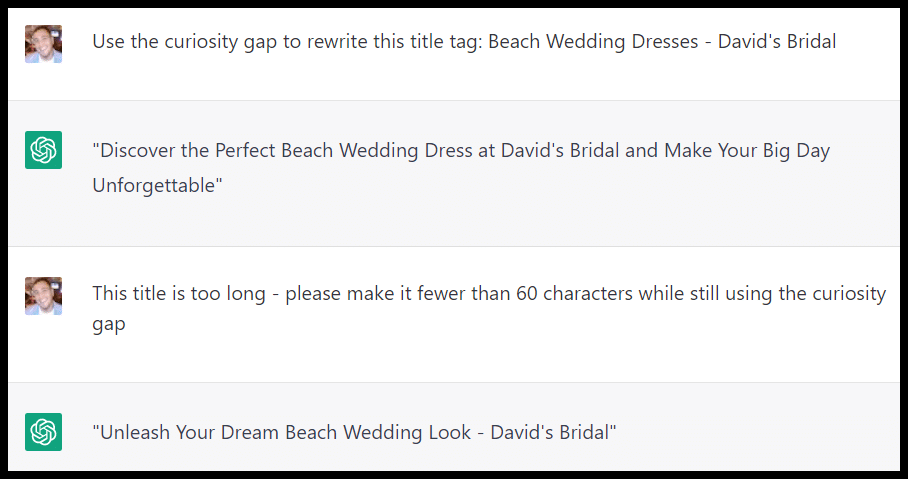Notifications
ALL BUSINESS
COMIDA
DIRECTORIES
ENTERTAINMENT
FINER THINGS
HEALTH
MARKETPLACE
MEMBER's ONLY
MONEY MATTER$
MOTIVATIONAL
NEWS & WEATHER
TECHNOLOGIA
TV NETWORKS
VIDEOS
VOTE USA 2026/2028
INVESTOR RELATIONS
DEV FOR 2025 / 2026
ALL BUSINESS
COMIDA
DIRECTORIES
ENTERTAINMENT
FINER THINGS
HEALTH
MARKETPLACE
MEMBER's ONLY
MONEY MATTER$
MOTIVATIONAL
NEWS & WEATHER
TECHNOLOGIA
TV NETWORKS
VIDEOS
VOTE USA 2026/2028
INVESTOR RELATIONS
DEV FOR 2025 / 2026
About Me
 Latinos Media
Latinos Media Latinos Media provides all types of news feeds on a daily basis to our Members
Posted by - Latinos Media -
on - March 27, 2023 -
Filed in - Marketing -
-
1K Views - 0 Comments - 0 Likes - 0 Reviews

ChatGPT can be helpful for many SEO-related functions, including but not limited to local SEO, keyword research and SEO-focused content creation.
Title tags are another area the platform can help you with. Even if Google doesn’t always use them, title tags are still a critical on-page SEO element.
Even Google’s John Mueller acknowledged that ChatGPT could be helpful for creating page titles.
This article examines how ChatGPT and the ChatGPT API can help you create compelling, clickable title tags.
Before we dive in, keep the following caveats in mind:
For this article, I’ll focus on tasks you can do using either the ChatGPT web interface or the API. But you can extrapolate some of these and imagine how they may work with the Da-Vinci API or future versions of the ChatGPT API.
Getting better title tags from ChatGPTLet’s start by having the tool help me rewrite a title tag using some best practices.
If you have your own process, you can implement that. In this case, I will try to get ChatGPT to rewrite my title tags “like a pro.”
First, I’m going to take an article by Ross Hudgens at Siege Media about SEO title tag best practices and have ChatGPT analyze it:

Next, I looked at the search results for “best beach wedding dresses” and grabbed a listing by David’s Bridal (just because it was ranking in the middle of the first page) and asked ChatGPT to rewrite their title tag:
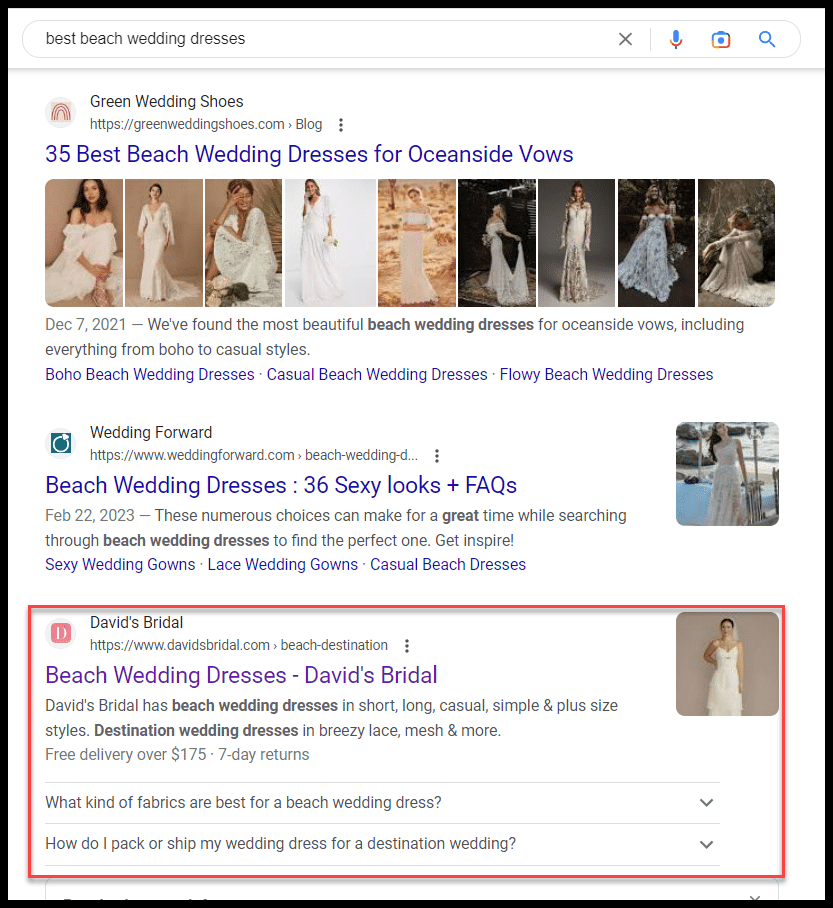
And here is what ChatGPT came up with after sharing the article and the title tag:

Pretty interesting!
Let’s try the same thing, but this time with a different title tag process from Mike at Niche Twins:
Let’s talk #blog TITLES and URL formats
— Mike (Niche Twins) (@NicheDown) April 12, 2022
short
Same approach here, I created a new chat (again: ChatGPT’s short memory!) and pasted in the contents of the thread and then asked ChatGPT to generate a new title tag based on Mike’s process:

ChatGPT does seem to have used a formula more in-line with the source, but it used a variation of “dream dress” again.
I’d opened a new chat for this prompt, so ChatGPT shouldn’t have used my previous prompt or result as context.
I asked it why it chose that term:

OK, so how about if we want to have ChatGPT ingest a long article (or multiple) and optimize multiple title tags?
Hudgens’s article was around 2,500 words, so we’ll be hitting up against the word and token limit of what ChatGPT actually remembers pretty quickly.
A good workaround is to get ChatGPT to summarize the article(s) and then use the summaries in place of the entire article (obviously, if there are some items you want to make sure are included, you may want to do the summarizing by hand):

Note that I will also create a new chat for each summary and a new chat once I’m ready to have ChatGPT write my title tags so that I can conserve “character memory.”
The summary ChatGPT generated in this case was 159 words. Here is the summary it came up with:

I created a new chat and shared the summary, then asked ChatGPT to rewrite the same title tag:

What jumps out here is that ChatGPT came up with a different title tag based on its own summary of the article versus the article itself as the prompt.
I wanted to try one more prompt here to see how it impacted the output, so I created a new chat and asked ChatGPT to summarize the article again, but this time to pull out the main best practices and create a bulleted list.
I created a new chat and fed ChatGPT its bulleted summary. It gave me another title tag idea and, this time, walked me through its process.

You want to be careful how much you trust ChatGPT’s summaries. But if I had gone through this exact process and were optimizing this URL’s title tag, I’d have some pretty interesting ideas to test.
Along those lines, I could take a summary here and get ideas for multiple URLs based on these best practices.
Write title tags like your competitorsLet's imagine Brides.com is crushing me in search results, and I want to test taking their approach to writing title tags for my pages. I can ask ChatGPT to give that a try:

And get a different idea:

ChatGPT is right: this is a straightforward example, but you get the idea.
You could also apply this same approach to a site that's not a competitor but a site you admire.
If you know they have great title tags or that they test them frequently, you could use the same approach here and get ideas specific to your site using a similar approach.
Write title tags based on the search resultsInstead of looking at one competitor, you could look at several. Namely all of the sites in a search result.
I asked ChatGPT to analyze the search result and come up with another new idea for David's Bridal based on what's ranking in their search result:

ChatGPT gave me a few different ideas:
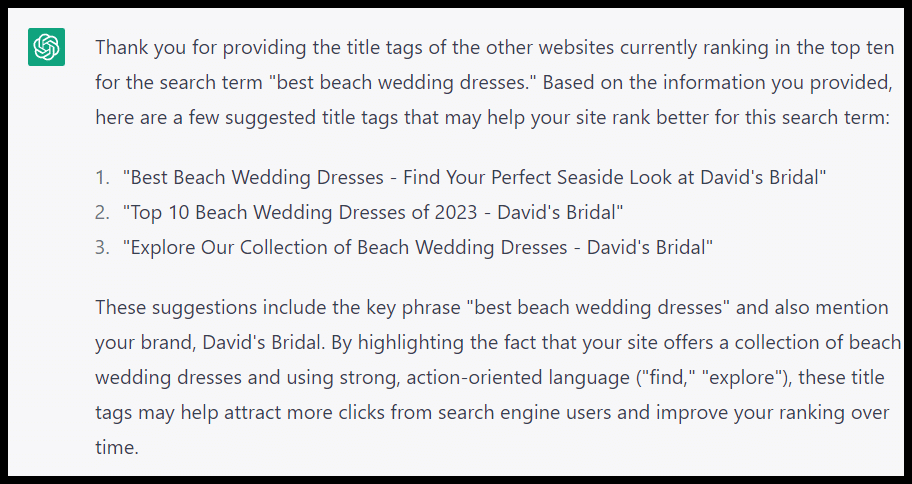
Another approach is obviously to summarize some content and ask ChatGPT to write a title tag for that content:
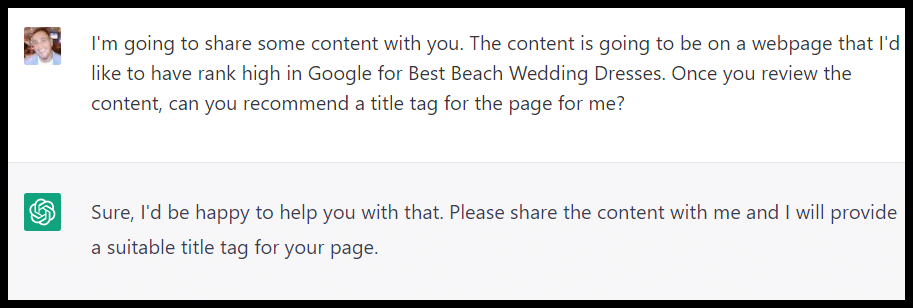
And here's ChatGPT's recommendation based on the content on the David's Bridal page:
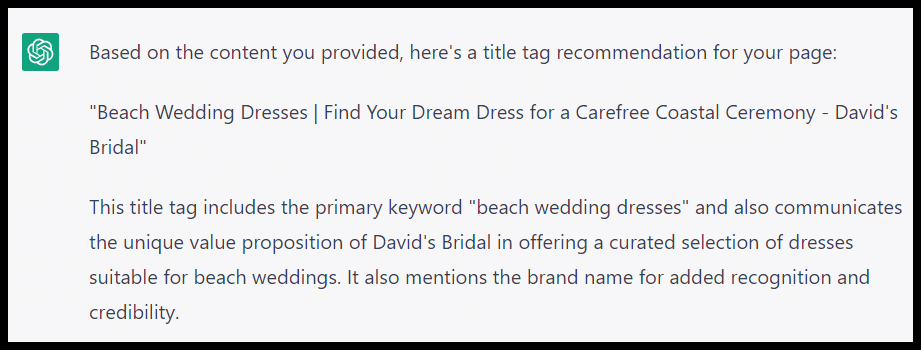
You could also marry these two approaches, feeding ChatGPT some title tag best practices and content and then asking for title tag ideas based on the topic of your article or page.
Title tag formulas and ChatGPT APIThe web interface is probably your best bet if you want to use lengthier best practices and lots of context or content to inform your title tags.
But if you want to apply a formula or a short set of best practices to several title tags, the ChatGPT API can be a great tool.
You can link the ChatGPT API to your Google Sheet as outlined here, and then could take your own best practices (or something you just found a competitor doing, or something you just pulled from an article) and rewrite multiple title tags at once:

I had some issues with the API adding quotation marks to the output here and writing very long titles.
By keeping a close eye on the output and playing with the prompts, I eventually got some new shorter title tag ideas.
Create specific types of title tagsIf you have some specific types of title tags you know have worked in the past, you can have ChatGPT apply that approach to specific titles you want to be rewritten.
To test these out, let's implement some tactics outlined in this Moz article on title tag "hacks."
Curiosity gapThis may not work for every title tag or on the first try. Here's our beach dress term rewritten using the curiosity gap:
